
Jindong Cai
Conductor Jindong Cai is director of the US-China Music Institute, professor of music and arts at Bard College, and associate conductor of The Orchestra Now (TŌN). Prior to joining Bard, he was a professor of performance at Stanford University for 14 years. Over his 30-year career in the United States, Cai has established himself as an active and dynamic conductor, scholar of Western classical music in China, and leading advocate of music from across Asia.
Cai started his professional conducting career with the Cincinnati Symphony Orchestra, and has worked with numerous orchestras throughout North America and Asia. He maintains strong ties to his homeland and has conducted most of the top orchestras in China. Cai has served as the principal guest conductor of the China Shenzhen Symphony Orchestra since 2012. He is a three-time recipient of the ASCAP Award for Adventurous Programming of Contemporary Music. Cai has received much critical acclaim for his opera performances. Cai serves as the principal guest conductor of the Mongolia State Academic Theatre of Opera and Ballet in Ulaanbaatar. Cai joined Stanford University faculty in 2004 as director of orchestral studies and conducted the Stanford Symphony Orchestra for 11 years. He is also the founder of the Stanford Pan-Asian Music Festival.
At Bard, Cai founded the annual China Now Music Festival. In its first two seasons, China Now presented new works by some of the most important Chinese composers of our time, with major concerts performed by The Orchestra Now at Bard’s Fisher Center for the Performing Arts, Lincoln Center, Carnegie Hall, and Stanford University. This year, the festival premiered a major new work by Pulitzer Prize–winning composer Zhou Long, Men of Iron and the Golden Spike—a symphonic oratorio, in commemoration of the Chinese railroad workers of North America on the 150th anniversary of the completion of the Transcontinental Railroad.
Together with his wife Sheila Melvin, Cai has coauthored many articles on the performing arts in China and the book Rhapsody in Red: How Western Classical Music Became Chinese. Their latest book, Beethoven in China: How the Great Composer Became an Icon in the People’s Republic, was published by Penguin in September 2015.
Born in Beijing, Cai received his early musical training in China, where he learned to play violin and piano. He came to the United States for his graduate studies at the New England Conservatory and the College-Conservatory of Music in Cincinnati. In 1989, he was selected to study with famed conductor Leonard Bernstein at the Tanglewood Music Center, and won the Conducting Fellowship Award at the Aspen Music Festival in 1990 and 1992.
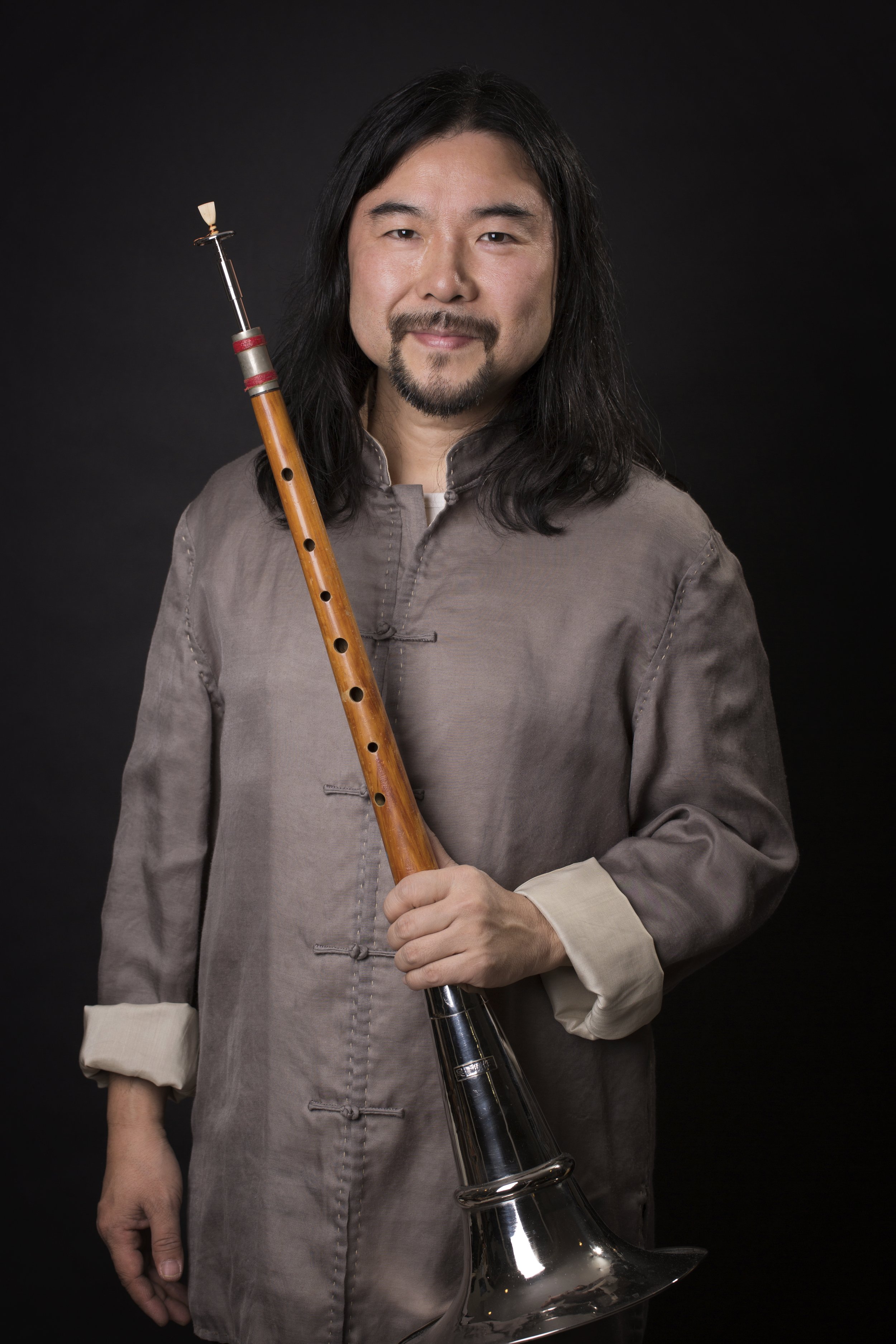
Guo Yazhi
Guo graduated with distinction from the Central Conservatory of Music in Beijing in 1990 and had lectured Suona at the Central Conservatory of Music for 9 years. He won many international awards including the Grand Prize at New York’s International ProMusicis Award (1998). He was named by the Ministry of Culture as one of China’s most outstanding musicians, and was invited to give a solo performance with Suona and Saxophone for the heads of states during the US President Clinton’s visit in Beijing in 1998. In 90’s, he also recorded the original songs for over 100 films and popular TV series, and were followed by huge fans.
In 1999 Guo was appointed as the Principal Suona by the Hong Kong Chinese Orchestra. Since then, he has performed with many orchestras around the world including Orchestra de la Suisse Switzerland, South Korea Daejeon Philharmonic Orchestra, Belgium’s Flanders Symphony Orchestra, Malaysia Chinese Orchestra, Singapore Chinese Orchestra, National Chinese Orchestra of Taiwan, and so on. He also actively lectured in Hong Kong Academy for Performing Arts, and led the Hong Kong Suona Association as the first executive director. His brilliant and expressive performance with a unique style has created many opportunities in the world of modern music for Suona. He received the Hong Kong Award for Best Artist in 2012.
In 2012 at age 46, Guo farewelled the highly competitive position which was held by him as a Principal Suona for 12 years in Hong Kong Chinese Orchestra. He relocated to Boston for exploring Jazz at Berklee College of Music. During studying at Berklee, he actively showcased the uniqueness of Suona at the various occasions, successfully made the traditional Suona more fashionable and popular. After graduated from Berklee with Artist Diploma in 2015, he led the Berklee Jazz band to visit China and Singapor, performed in many cities, and lectured at the colleges. The fusion-style Jazz performance - Suona with the Jazz band is really an eye-opening experience and highly received by Chinese and American audience. In 2016, Guo received Thank You letters from the Mayor of Boston and the Governor of Massachusetts for the excellence in cross-cultural contribution.
Guo is not only a multi-instrumentalist, specialized in woodwind, but he also is an innovator. He has obtained several patents for instruments like the suona, Hulusi, and Guzheng. One of which, the flexible core of Suona, a movable reed. He received the Second-Tier Scientific Progress Award from the Ministry of Culture in China. It allows the traditional Suona to undergo a significant breakthrough in its abilities to alter modes and change sounds at any time during a live performance. It makes the Suona more expressive, allowing for a deeper integration with Western music. He is also a visiting artist and teaching master classes at Philadelphia University of the Arts and Berklee college of Music.
Guo currently resides in Boston with his wife and two daughters.
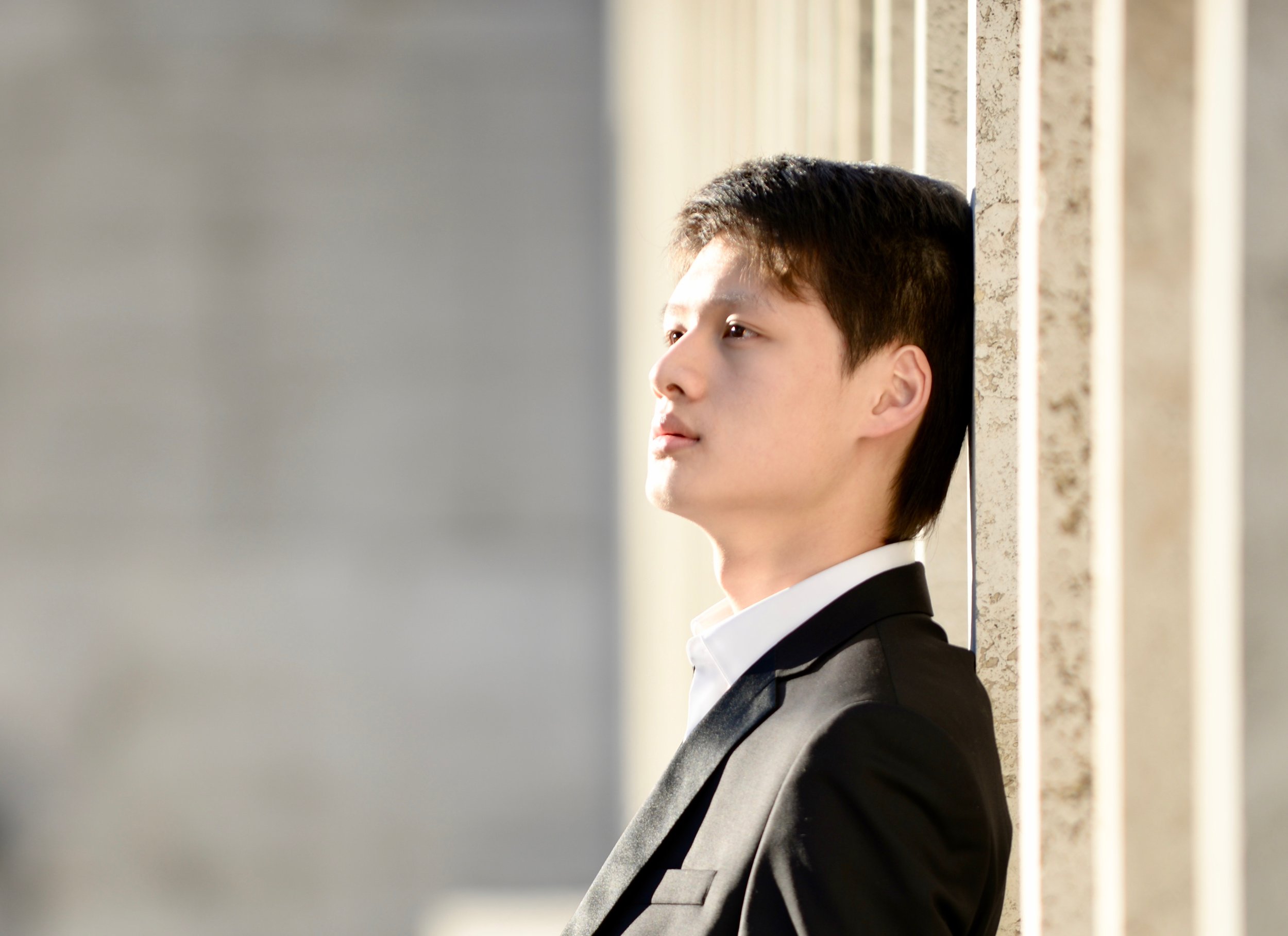
Ju Xiaofu
Pianist Xiaofu Ju was awarded first prize in the Second Hong Kong International Piano Competition, the Eighth Asian Piano Finals, the first Shanghai Himalaya National Youth Piano Competition, and the First Youth Piano Competition of Shanghai Conservatory of Music.
He was a finalist of The Pearl River Piano Competition in China and recipient of the Juilliard Kenneth M. and Josephine J. Bissell Scholarship, the Martin Canin Scholarship and the Adele Marcus Piano Scholarship. Ju was a featured soloist on the opening ceremony of the second Youth Olympic Games and the Salzburg Profound Arts Festival. The world-renowned Pianist Jörg Demus recognized Ju as a “Pianist with promising talents and a natural depth in music.”
In recent seasons, Ju has performed with China Philharmonic, Beijing Symphony, Xi’an Symphony and Jiangsu Symphony as a soloist. Appeared in recitals at New York, Bergen, Beijing and Shanghai; in 2021 he premiered Philip Glass Concerto No.3 at MISA festival in Shanghai (China premiere).
Ju has performed in Wiener Musikverein, Salzburg Congress, China National Center For The Performing Arts, the Great Hall of People in Beijing, Shanghai Concert Hall, Shanghai Oriental Art Center, Shanghai Symphony Hall, in addition to venues in New York, Los Angeles, Norway, Croatia, Guangzhou, Nanjing, Japan, Singapore, Kuala Lumpur, Hong Kong, etc.
Since his orchestral debut at age 14 with Shanghai Philharmonic, where he performed Beethoven Piano Concerto No.3, he has successfully played with orchestras including Wiener Hofburg Orchester, China Central Opera House, Shanghai Philharmonic, Shanghai Opera House, Japan Gunma Youth Symphony, Russian Ке́меров National Symphony, Jiangsu Symphony, and the Hong Kong Youth Philharmonic.
Ju has had the honor to study and play for many influential pianists, including Jörg
Demus, Gary Graffman, Tamas Vasary, Vladimir Viardo, Jerome Lowenthal, Arie Vardi,
Shikun Liu, Boris Berman, Dina Yoffe, Robert Levin, Pavlina Dokovska, Marc-Andre Hamelin, Dimitri Alexeev, Vladimir Ovchinnikov and Leif-Ove Andsnes.
Ju started learning piano at the age of 4. He is a graduate from Music Middle School Affiliated to Shanghai Conservatory of Music, where he studied with Ting Zhou. Ju is currently pursuing his Bachelor of Music Degree at The Juilliard School under the tutelage of Yoheved Kaplinsky. In 2019, he published a collection of his poetry, On the Path Seeking for the Ruins of Spring.
Xiaofu Ju was chosen to be the first ambassador of Pearl River Piano.
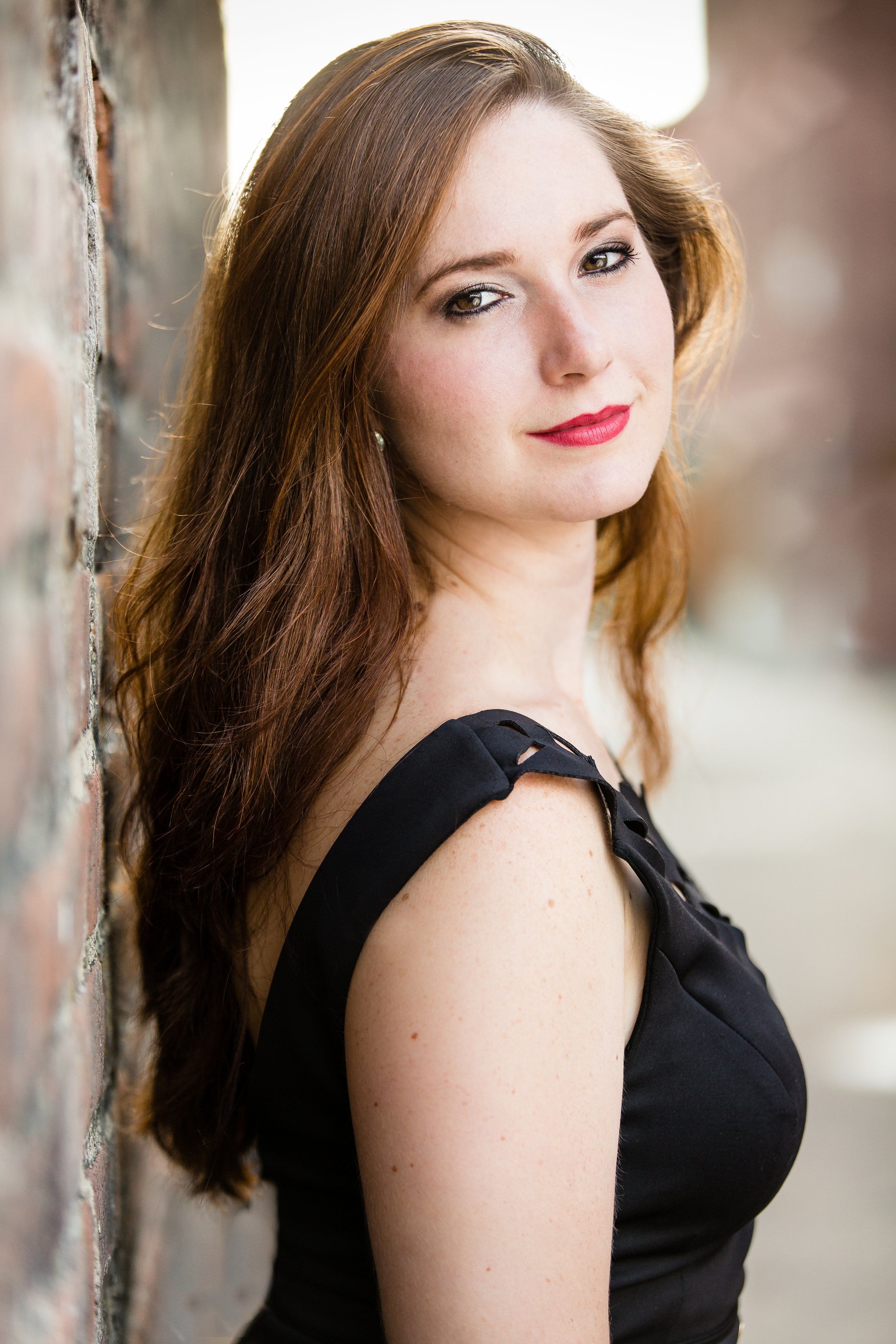
Esther Maureen Kelly
American soprano, Esther Maureen Kelly, is at home performing in operas and concerts around the globe. She completed a Master of Music in Opera Performance at the University of Maryland as a member of the Maryland Opera Studio in the Spring of 2017, and has since been based out of Dallas, TX. In recent seasons, she premiered the role of Maddy in Jonathan Shin's All Things Shall Pass, and performed as Diane in Orphée aux enfers, both Amore and Euridice in Orfeo ed Euridice, Female Chorus in The Rape of Lucretia, the First Lady in Die Zauberflöte, and Michelle in the world premiere of Another Country. In addition to performing those roles, she also recently covered Alexandra in Regina and studied Antonia in Les contes d'Hoffmann. During the summer of 2019, she returned to perform with the iSING! International Young Artist Festival.
Prior to beginning graduate school, she lived in Houston, TX for a year and a half, during which time she sang with the Houston Grand Opera (HGO) Chorus and performed the role of Yum Yum in Gilbert & Sullivan’s The Mikado at St. Luke’s UMC. While singing with HGO, she was a chorus member in both Verdi’s Aida and Otello, in the U.S. premier of Weinberg’s opera, The Passenger, as well as in Mozart’s Die Zauberflöte and Sondheim’s Sweeney Todd.
A graduate of Pepperdine University, she received her Bachelor’s of Art in Music degree in the Spring of 2013. In 2011 she made her debut on the Pepperdine stage singing the role of Alma March in Little Women, and was again there in 2012 as a chorus member in Die Fledermaus. Over the past few summers, Ms Kelly has attended iSING! International Festival, the Aspen Music Festival and School, OperaNEO, Pepperdine University’s Heidelberg program, and the Boston University Tanglewood Institute. These programs granted her the opportunity to perform scenes from Idomeneo, Il viaggio a Reims, Les contes d'Hoffmann, Così fan tutte, The Music Shop, Le nozze di Figaro, Don Giovanni, and Otello, as well as a fully staged and orchestrated production of Le nozze di Figaro, in which she was Contessa Almaviva.
When she was fourteen years old, Esther Maureen Kelly was fortunate to begin her opera career as a Bridesmaid and chorister in Le nozze di Figaro, followed by La Traviata and Turandot, which was put on by the Singapore Lyric Opera in Singapore’s national opera house, The Esplanade.
Ms. Kelly is thankful to have worked with outstanding music teachers and coaches. When in Singapore, she studies with Khor Ai Ming, but has also had the immense pleasure of working with Barbara Clark, Linda Mabbs, Lois Alba, and Melanie Emelio.

José Rubio
Baritone José Rubio’s recent international operatic engagements have included debuts at the Berlin Staatsoper, the Elbphilharmonie concert hall in Hamburg, and in Vienna at the Ronacher Theater. He is among the first westerners to sing leading roles in China in contemporary mandarin language operas, which have led to his debuts at the National Center for the Performing Arts in Beijing, the Shanghai Grand Theater, and the Jiangsu Grand Theater in Nanjing.
His operatic credits include the title roles in Il Barbiere di Siviglia, Don Giovanni, Le Nozze di Figaro, and Gianni Schicchi. Other credits include Escamillo in Carmen, Enrico in Lucia di Lammermoor, Marcello and Schaunard in La Bohème, Guglielmo in Così fan Tutte, Tarquinius in The Rape of` Lucretia, Tonio in I Pagliacci, Alfio in Cavalleria Rusticana, Hannah Before in As One, El Payador in Maria de Buenos Aires, Le Mari in Les Mamelles de Tiresias, Dr. Rappaccini in La hija de Rappaccini and Dr. Falke in Die Fledermaus. His leading credits include principal roles for Cincinnati Opera, Seattle Opera, Portland Opera, Nashville Opera, Alamo City Opera, Asheville Lyric Opera, Tacoma Opera, Vashon Opera, and Juneau Lyric Opera.
He has been a guest soloist with the Shenzhen Symphony Orchestra, the Suzhou Symphony Orchestra, Albany Symphony, Boise Philharmonic, Evansville Philharmonic, the Bellingham Symphony Orchestra, Philharmonia Northwest, and the Rogue Valley Symphony. In recital he has appeared at Carnegie Hall and the Tianjin Julliard School.
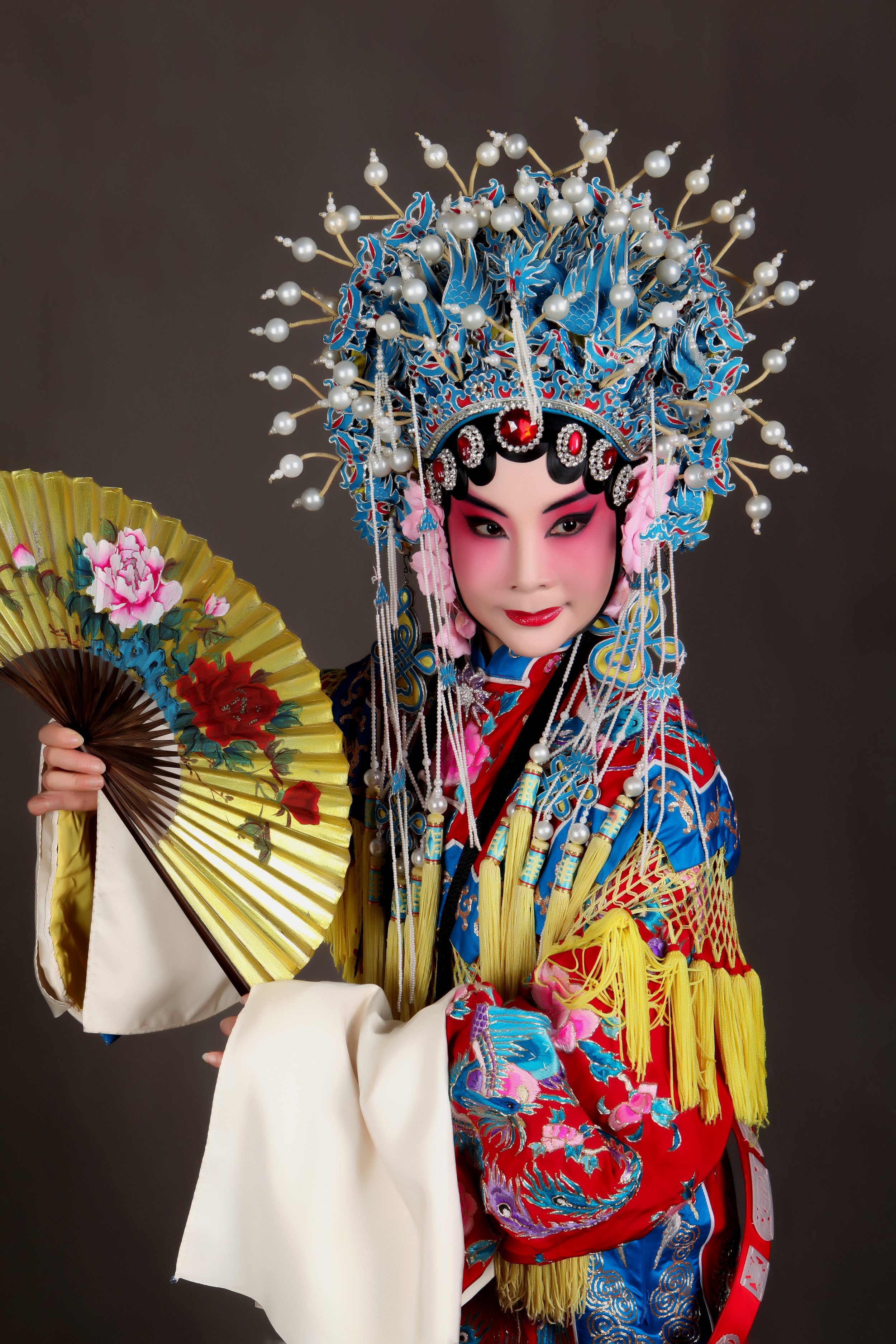
Song Feihong
Song Feihong is the daughter of Song Baoluo, a famous Peking Opera artist who used to sing for the last emperor in China. Although gifted in music, art and literature like her renowned father, the Song did not pursue a career as a professional singer, but instead became a cultural ambassador through years of dedication to teaching and sponsoring cultural events in the Chinese community. She has devoted more than 200 hours a year at different schools demonstrating Chinese culture and performing Peking opera in the traditional form in which she was trained. She also owns the successful New China Bookstore located in Philadelphia.
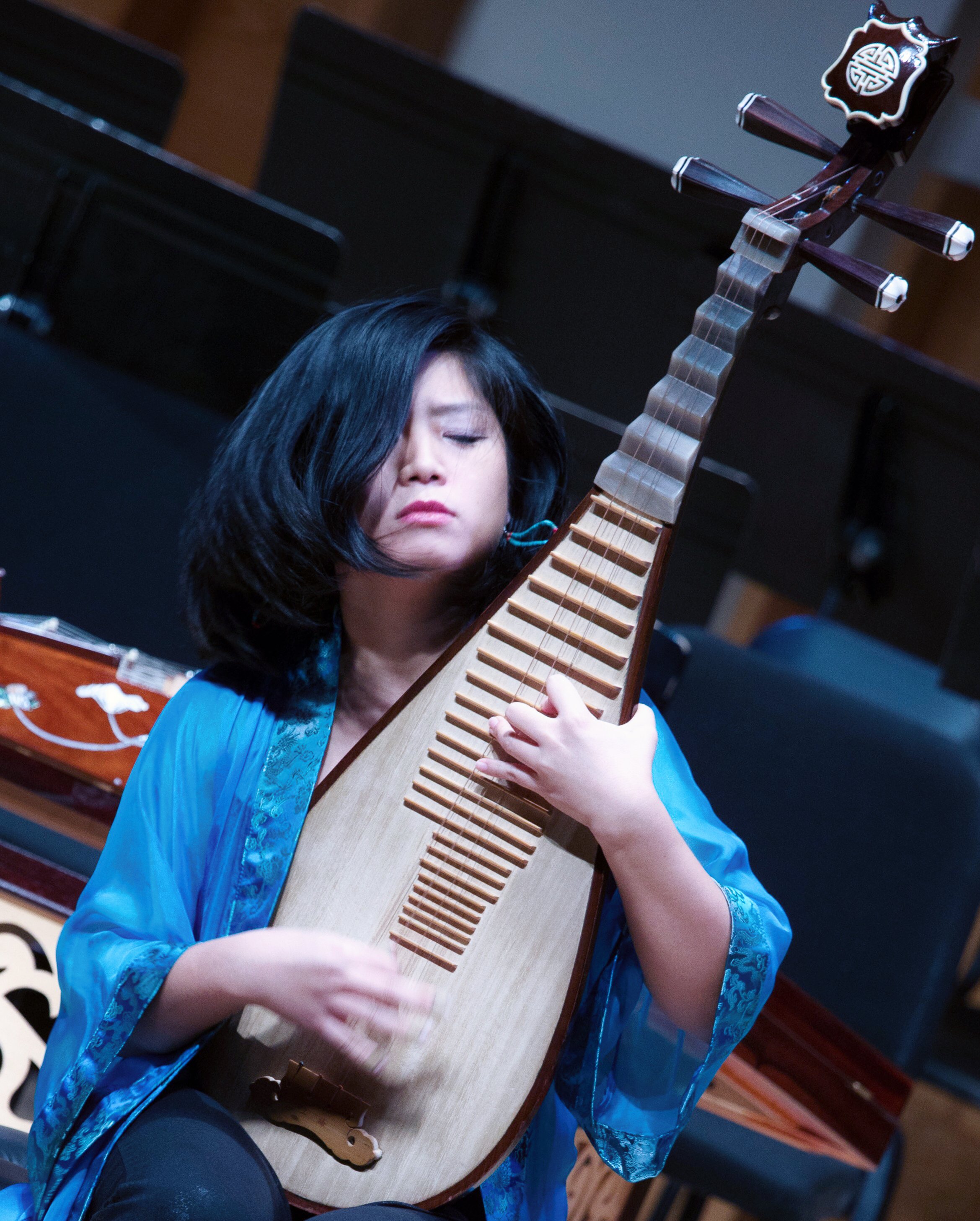
Zhou Yi
Praised for her “breathtaking” meticulous technique and expressiveness by the Washington Post, New York-based pipa (Chinese lute) soloist Zhou Yi was born in Shanghai, China. At the age of five, Zhou Yi was discovered in kindergarten by a Chinese instrumentalist talent scout, Yuanlong Cao. Zhou Yi gave her first public recital at six. She continued training for two years on the pipa before enrolling in the elementary school of the Shanghai Conservatory of Music, one of China's premier music schools. During her time in the Shanghai Conservatory of Music, her mentors include Zupei Zhang, Zhongle Wei, Ya Dong, Shuhong Dai, Youren Lin and Xuran Ye.
As a concert soloist, some of her highlight performances and concerto repertoire include: Tan Dun’s Concerto for Pipa and String Orchestra at the Gewandhaus in Leipzig Germany; Young People’s Concert with the New York Philharmonic; Bun-Ching Lam’s Song of the Pipa with the Metropolitan Symphony Orchestra; Zuqiang Wu’s Sisters of the Grassland with the Ohio Youngstown Symphony Orchestra; Shih-Hui Chen’s Jin (Metal) for pipa and orchestra; Bright Sheng’s Three Songs for Violoncello and Pipa; Chen Yi’s Points and Ancient Dances for pipa and percussion; Zhou Long’s Green for flute and pipa; Victoria Bond’s Bridges for erhu, pipa and two clarinets; Bingyang Li’s Snow of June for mixed ensemble (world premiere at Carnegie Hall); Thomas Reiner's Sweet Spots for double bass clarinet, pipa and orchestra (world premiere in Alaska CrossSound Music Festival). Zhou Yi also collaborated with young Chinese composers’ premiere works in various styles, such as: Dongqing Fang’s Drunken Master for piano, cello and pipa (North America premiere, Carnegie Hall); Xinyan Li’s Dunhuang Lovers for flute, cello and pipa (world premiere, Carnegie Hall); Jianbing Hu’s Fine Sound from Tianzhu for pipa and cello (world premiere, NEC Jordan Hall); Angel Lam’s theatrical work, Lost in Shanghai (world premiere, National Sawdust); Qian Zhou’s Qu Shui Ming Yun (Sounds from the Winding Water) for qin and electronic (world premiere, Mata Festival); Du Yun’s Kung Fu (The Bruce Lee Story) soundtrack for David Henry Huang’s off-broadway production (world premiere).
Zhou Yi’s other guest appearances in operatic and festival productions are: guest qin artist in Bright Sheng’s Dream of the Red Chamber (San Francisco Opera); guest pipa and qin artist in Huang Ruo’s Paradise Interrupted (Lincoln Center Festival) and Dr. Sun Yat-sen (Santa Fe Opera); Chen Shi-Zheng’s the Peony Pavilion, the Orphan of Zhao and Ghost Lovers with the Lincoln Center Festival; Bun-Ching Lam’s Wen Ji - Eighteen Songs of Nomad Flute with the New York Asia Society; the Shen Wei Dance Arts’ Second Visit to the Empress with the American Dance Festival; the Bowling Green New Music & Art Festival.

The Orchestra Now (TŌN)
Music Director, Leon Botstein
The Orchestra Now (TŌN) is a group of vibrant young musicians from across the globe who are making orchestral music relevant to 21st-century audiences. They are lifting the curtain on the musicians’ experience and sharing their unique personal insights in a welcoming environment. Conductor, educator, and music historian Leon Botstein founded TŌN in 2015 as a master’s degree program at Bard College, where he also serves as president. The orchestra is in residence at Bard’s Fisher Center for the Performing Arts, presenting multiple concerts there each season as well as taking part in the annual Bard Music Festival. It also performs regularly at the finest venues in New York and beyond, including Carnegie Hall, Lincoln Center, Metropolitan Museum of Art, and elsewhere. The orchestra has performed with many distinguished conductors, including Fabio Luisi, Neeme Järvi, Gerard Schwarz, and JoAnn Falletta. theorchestranow.org








